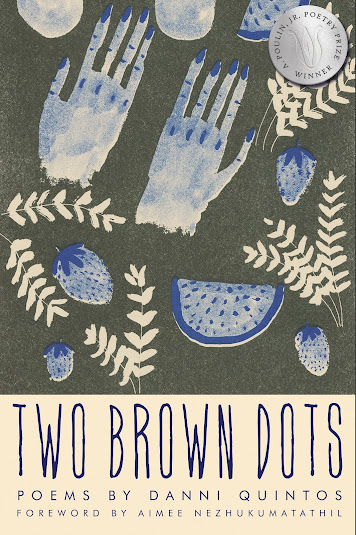Something from Nothing
It feels like we’re doing
everything
in preparation for
instead of
to distract ourselves from
pregnancy. Yes, I wish I was
nauseous & constipated,
I wish my ankles
would swell, my feet wide
as skis.
Zach is planting &
cultivating
all the space we have
outside:
greens, fruit trees, root
vegetables,
climbing peas & herbs
whose leaves
take lacy doily shape. I am
turning
long lines of wool into
cloth: knots
knitting with bamboo
needles while I watch
everything my TV
suggests. This is self
-reliance. Reproduction &
production,
something growing where
there didn’t
before seem to be space.
Selected by Aimee Nezhukumatathil as the winner of the A. Poulin, Jr. Poetry Prize is the full-length poetry debut Two Brown Dots: Poems (Rochester NY: BOA Editions, 2022) by “Kentuckian, a mom, a knitter, and an Affrilachian Poet” Danni Quintos. Her first-person explorations and recollections write around and through a self-determination and self-creation, seeking answers to a space she requires to singularly establish; illuminating lyrics around memory and being, offering answers as best as she is able, in due course, due time. Set in three sections—“Girlhood,” “Motherhood” and “Folklore”—Quintos writes across the length and breadth of lived experience, from watching her father from a distance, summers and childhood crushes and living as an awkward youth, to the experiences of pregnancy and eventual motherhood. She offers stories of her connections to the Philippines, writing of a familial background she simultaneously holds and can’t help but carry, offering, as part of the poem “Possible Reasons My Dad Won’t Return to the Philippines,” “What if he remembers everything [.]” A few lines further, as the poem ends: “[…] the little boy in him left / here with all the cousins, no one / to call nanay or tatay, alone, / the shape of him on a mattress / the version of him that stayed.” She writes of differences, from the ways in which most (if not all) teenagers feel as outsiders, to the consequences of racism, reacting to boundary-making micro-aggressions offered for no reason other than the colour of her skin. “I didn’t yet / understand. And every summer after,” the poem “Brown Girls” ends, “a whirring // reminder that I didn’t belong here, a little song / sung at me by the bodies that slept for years // underground. How we couldn’t see what he saw: / two brown girls under a white couple’s roof.” In certain ways, Two Brown Dots is a collection of poems entirely centred around the body, and how those bodies are experienced, both from outside and within, offering physical responses through the lyric, from adolescence to the fact of living in a predominantly Caucasian space. Her poems are sly and smart, curious and rife with detailed narrative. In the poem “Boobs,” from the opening section, she reveals the phrase from whence the collection finds its title, writing: “In fifth-grade gym class I ran into the padded walls / and felt like marbles bruised me under my shirt. That night // I dreamt they were big & flouncy and I looked at myself / in a mirror, laughing. In a field at recess I did a cartwheel // and Elliott Fess saw my shirt fly up to my chin. I’d forgotten / we were different now. When I asked, did you see anything? // he said, just two brown dots.” Through Two Brown Dots, Quinto manages optimistic poems on awkwardness, uncertainty and a feeling of displacement, packed with story, family and connection, offering observations, recollections and revelations, as one step immediately following another, building a home out of what might otherwise have seemed impossible. “We are two sisters in the middle / of the world where the sun paints us // bronze.” she writes, close to the end of the poem “Pond’s White Beauty.” Or, as Nezhukumatathil’s “Foreword” opens:
Danni Quintos knows how
to create light. After so much darkness brought about by climate change, political
strife, and, most recently, a global pandemic among other devastations. I’m so
glad for this spark. I’m reminded of that old Rumi missive: “If light is in
your heart, you will find your way home.” Quintos is a lighthouse when it comes
to revealing essential truths about finding your way when you feel alone or misunderstood—our
ability to feel lonesome can be just as equaled by our ability to find love,
even in the most unexpected ways. This debut thrillingly gives us a triumphant
vocabulary with which to make sense, celebrate, and ponder the wild and
ecstatic bafflements of coming-of-age, and what it means to insist and
cultivate a home for yourself (and others) with courage and grace.

No comments:
Post a Comment